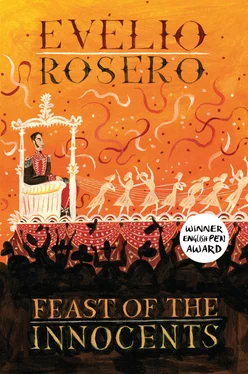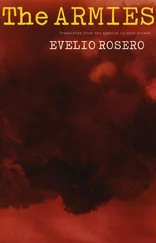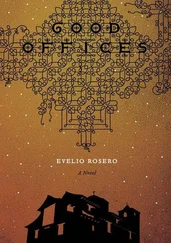“Your daughter,” she said.
“My daughter?”
“Your daughter.”
“Which one? Floridita didn’t want to say hello to me.”
“Luz de Luna.”
“Where is she, Genoveva? I already asked you, don’t you remember?”
“I think she’s in the stables, Doctor. It hasn’t occurred to her to leave the stables all afternoon.”
He strode off towards the stables.
But the cook did not want to follow him there.
“Whenever you see the stars, I’ll be seeing them too, Luz de Luna, and we’ll go on seeing like that for ever and ever, wherever we are, you in Pasto and me in Bogotá.”
That is what the doctor heard on entering the stables: through the high, unglazed window, the world’s stars were peeping in. Who was talking? He did not recognize the boy in the gloom, but he saw him trying to sit up and then stop, embarrassed, and he also heard him call him “uncle.” It was another of Matilde Pinzón’s sons.
The two cousins were sitting on the dirt floor, lying back against a mound of chaff, shoulder to shoulder, hands entwined. His fifteen-year-old daughter’s long black hair was tangled, strewn with bits of straw, and there was dirt on her blouse. The doctor took all this in at a glance, along with her shining eyes, and heard her trembling voice, as frightened as it was resolute:
“Papá. You made it.”
“And now I’m leaving,” the doctor said. “I’ve got things to do in Pasto.”
“Yes, Papá.”
“Your mother has gone to Pasto, in case you didn’t know. You’ll have to take charge, stay with Genoveva, look after your little sister.”
“Yes, Papá.”
“I don’t want you hanging around in the stables any longer, okay?”
“Yes, Papá.”
“Did you hear me?”
“Yes, Papá.”
The two cousins got up without letting go of one another’s hands, like it was some kind of shared challenge: it seemed they wanted to shout to the world that they were a couple. Proud of themselves, they ascertained that the doctor was not making a fuss, quite the reverse; he followed them in silence, at a distance. The doctor wondered what he should do. He suffered over the way things were, or the way the world was — what had things come to with his daughters, this tremendous distance between them in which he, alone, was the outsider, the intruder? Oh, if only he had not had them, he thought, if only he were not tied to Primavera, if he lived alone, could do his own thing: he would be free, he would have stayed with the artisans all night, celebrating the future as it should be celebrated. It’s too late now, he thought, too late for this family man.
“Goodbye, dear. Come and say goodbye to me.”
Luz de Luna gave him a kiss on the cheek.
“Bye, Papá.”
The boy said goodbye too, from a distance:
“Bye, Uncle.”
And the doctor was on the point of explaining to him, “I’m not your uncle, I’m your aunt Primavera’s husband, I’ve got nothing to do with your family,” but he stopped himself. He remembered that years ago he had thought the boy showed signs of learning difficulties, and he had been on the point of alerting Primavera to the fact, so she could tell her sister.
Well, no, he said to himself, as he drove the Land Rover along the highway, he’s no retard, he’s another poet talking about stars and he’s already deflowered Luz de Luna—“dammit!” he yelled into the night — I hope her mother has at least given her some good advice about how not to end up pregnant. Primavera Pinzón, who would not one day wish to become your murderer?
Just seconds before opening the door to his house he realized Primavera was not expecting him: really not expecting him, he thought. He was going to surprise her, then. In fact, it had seemed odd to him that the Volkswagen was parked on the street, why hadn’t she put it in the garage? Primavera would be going out that night, and where to? He did not open up the garage either, and parked the jeep on the other side of the road.
He was already pushing open the door when a woman’s voice in the street waylaid him—“Doctor”—this startled him: he had not noticed how close she was. “Who’s that?” he asked, as he did not recognize the woman with a dark veil over her head — the veil of the churchgoing faithful, half covering her face. “It’s Alcira Sarasti,” she said.
It was the wife of Arcángel de los Ríos.
The doctor greeted her impatiently; he did not want to know anything about anything anymore, and much less about Furibundo Pita and his revolver.
“He’s told me everything,” she said.
She sounded on the verge of tears. The doctor remembered her: she had been the very shy, skinny, mixed-race girl who used to keep herself to herself and read her Bible on a bench in the children’s park; and she’s still beautiful, he thought, an innate beauty, who knows what penance cast her into Furibundo Pita’s jaws, but didn’t she try to kill me one Innocents’ Day with those poisoned empanaditas ? And hadn’t he been in love with her when they were children? Wasn’t she the same girl leaning over a balcony, a black Bible in her pale hands? The same Bible she was always reading as a youngster? It was her.
She swallowed air, as though it would give her courage to speak.
“He told me he fired at a man, and that he doesn’t know how.”
She waited a few seconds for the doctor to answer but he was so surprised that he could not. He just thought: I don’t know how either.
“He told me he fired at Maestro Abril and he doesn’t know how; he’s sorry.”
The doctor remained mute.
“Arcángel’s not like they say. He drinks, it’s true, but that’s all; he’s done me harm, but he’s a good man, when all’s said and done.”
Doctor Proceso looked at her in amazement: there was Alcira Sarasti, sticking up for Furibundo Pita.
“He told me about the float, about what that float represents. I myself…” she said, stifling a sob and raising her voice, “I’d be the first to be insulted; how could such a float occur to a man like Maestro Abril, someone I know? How many times did I go to his house with the Day of the Poor ladies to comfort his children, to leave shopping, pencils and exercise books, clothes, medicines; why does he repay us in such a mean-spirited way? How could he think of goading my husband? He knows my husband well; the whole of Pasto knows my husband when he drinks. Don Tulio Abril knew perfectly well what he was taking on.”
And she made up her mind to ask, terrified:
“Tell me, Doctor, for goodness’ sake, just tell me he didn’t kill him.”
She had started to cry.
“He didn’t kill him,” the doctor said.
She crossed herself.
“Thanks be to the Blessed Virgin of La Playa,” she said, and lifted the veil from her face; her shining eyes appeared, her voice recovered:
“I knew God would protect us, how could Arcángel think of firing at so good a man as Maestro Abril?”
The doctor looked at her, yet more astonished.
“I don’t know,” he said.
And he was about to go in, but she stopped him; she placed her gloved hand on the doctor’s arm.
“Wait,” she whispered, “are you in a hurry? Are you sure Señora Primavera’s expecting you? Come over to ours, just one minute, Arcángel needs you. He sent me to beg you to listen to him, one minute.”
“Tell him he didn’t hurt anyone. The float won’t be seen. Tell him to forget the whole thing.”
And once more, he made as if to go inside.
“No,” she said, “don’t go in, please.”
Did she really want to stop him entering his own home? It seemed so: her hand bore down on the doctor’s arm. And, all of a sudden, she began to stroke it, really began to stroke it, she was stroking it: the doctor found that Alcira Sarasti was stroking his arm without realizing it, as if she were caressing him.
Читать дальше












